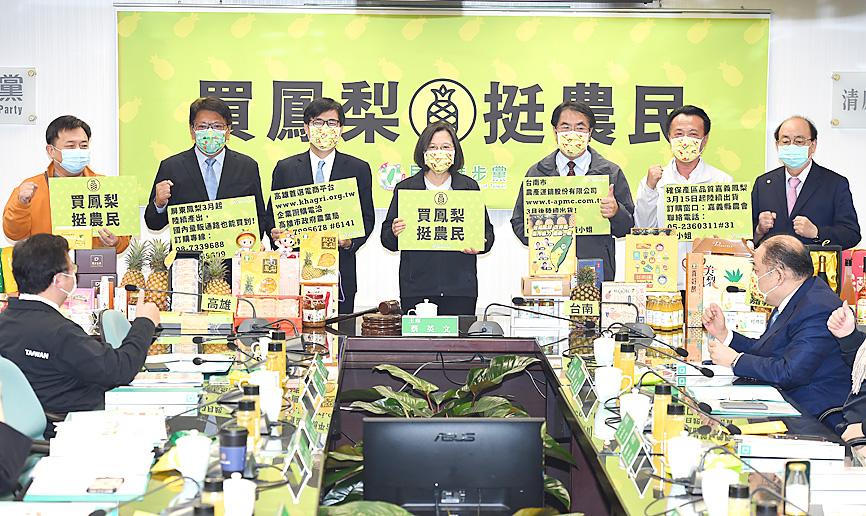President Tsai Ing-wen (蔡英文) yesterday promoted pineapples along with Democratic Progressive Party (DPP) local government heads from southern Taiwan.
China on Friday last week announced that from Monday it would suspend imports of Taiwanese pineapples, citing concerns about harmful organisms found on the fruits. The import ban accounts for nearly 10 percent of Taiwan’s annual pineapple production, but the amount was offset after the public and private sectors joined forces to purchase the fruit.
The party has set up a “pineapple national team,” Tsai, who is the DPP chairperson, told a news conference at the party’s headquarters in Taipei.

Photo: Liao Chen-huei, Taipei Times
She urged Taiwanese to consume fresh pineapples and pineapple-based products.
Tsai was joined by the heads of local government from Tainan and Kaohsiung, as well Chiayi and Pingtung counties, which are the nation’s main pineapple production regions.
DPP officials at the event presented fresh pineapples and a variety of finished products, including pineapple cakes, pineapple jam, pineapple toast, as well as vinegar, wine, sauce, and cosmetics and health food products made from the fruit.
Tsai thanked Taiwanese for helping pineapple farmers over the past few days, saying: “Taiwan will stand together in unity, as people face unreasonable actions in international trade.”
“A number of foreign embassies and representative offices have expressed their support for Taiwanese pineapples, so we wish to thank all our international friends for their support, as well our citizens for uniting to help the nation’s pineapple growers,” Tsai said.
The pineapple harvest gets under way later this month and continues for several months, she said, adding that now is the time to place orders.
People could buy additional pineapples during the harvest season to help pineapple farmers overcome the challenge, she added.
“A crisis also creates new opportunities. When facing challenges, Taiwan never gets knocked down. We take them on and grow stronger,” she said. “Taiwanese came together to support hardworking farmers and their high-quality products. The international community will also stand with Taiwan.”
SUPPORT BASES
Kaohsiung Mayor Chen Chi-mai (陳其邁) said that “the DPP has important support bases in southern Taiwan, which overlaps with pineapple production areas, so it is natural for DPP supporters to eat pineapples, and when China lashes out against our pineapples, we have to join forces.”
Pingtung County Commissioner Pan Men-an (潘孟安) said: “Pingtung is the locomotive driving Taiwan’s pineapple production and is to enter harvest season next week. When China banned Taiwan pineapple imports on Friday, we immediately prepared containers of pineapples to ship to Japan.”
Pingtung also produces a variety of processed pineapple products, Pan said, urging people to buy pineapples at intervals over the coming months to ensure they have the freshest, top-quality pineapples.

The High Prosecutors’ Office yesterday withdrew an appeal against the acquittal of a former bank manager 22 years after his death, marking Taiwan’s first instance of prosecutors rendering posthumous justice to a wrongfully convicted defendant. Chu Ching-en (諸慶恩) — formerly a manager at the Taipei branch of BNP Paribas — was in 1999 accused by Weng Mao-chung (翁茂鍾), then-president of Chia Her Industrial Co, of forging a request for a fixed deposit of US$10 million by I-Hwa Industrial Co, a subsidiary of Chia Her, which was used as collateral. Chu was ruled not guilty in the first trial, but was found guilty

DEADLOCK: As the commission is unable to forum a quorum to review license renewal applications, the channel operators are not at fault and can air past their license date The National Communications Commission (NCC) yesterday said that the Public Television Service (PTS) and 36 other television and radio broadcasters could continue airing, despite the commission’s inability to meet a quorum to review their license renewal applications. The licenses of PTS and the other channels are set to expire between this month and June. The National Communications Commission Organization Act (國家通訊傳播委員會組織法) stipulates that the commission must meet the mandated quorum of four to hold a valid meeting. The seven-member commission currently has only three commissioners. “We have informed the channel operators of the progress we have made in reviewing their license renewal applications, and

Taiwan People’s Party (TPP) Chairman Huang Kuo-chang (黃國昌) yesterday appealed to the authorities to release former Taipei mayor Ko Wen-je (柯文哲) from pretrial detention amid conflicting reports about his health. The TPP at a news conference on Thursday said that Ko should be released to a hospital for treatment, adding that he has blood in his urine and had spells of pain and nausea followed by vomiting over the past three months. Hsieh Yen-yau (謝炎堯), a retired professor of internal medicine and Ko’s former teacher, said that Ko’s symptoms aligned with gallstones, kidney inflammation and potentially dangerous heart conditions. Ko, charged with

Taiwan-based publisher Li Yanhe (李延賀) has been sentenced to three years in prison, fined 50,000 yuan (US$6,890) in personal assets and deprived political rights for one year for “inciting secession” in China, China's Taiwan Affairs Office spokesman Chen Binhua (陳斌華) said today. The Shanghai First Intermediate People’s Court announced the verdict on Feb. 17, Chen said. The trial was conducted lawfully, and in an open and fair manner, he said, adding that the verdict has since come into legal effect. The defendant reportedly admitted guilt and would appeal within the statutory appeal period, he said, adding that the defendant and his family have